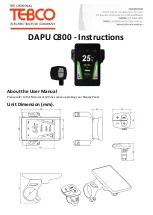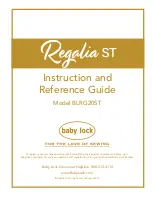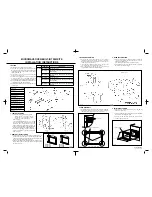
Precipitation and Wind Sensor KNX RW sl
2
Precipitation and Wind Sensor KNX RW sl
• Version: 14.04.2020 • Technical changes and errors excepted. • Elsner Elektronik GmbH • Sohlengrund 16 • 75395 Ostelsheim • Germany • www.elsner-elektronik.de •
Technical Service: +49 (0) 7033 / 30945-250
2.3. Sensor position
ATTENTION!
Sensitive wind sensor.
•
Remove the protective transport sticker after installation.
•
Do not touch the sensor on the wind measuring element (below,
countersunk).
2.4. Sensor assembly
2.4.1. Attach mount
First, assemble the mount for wall/pole mounting. Release the screw joint of the
mount with a cross-headed screwdriver.
Wall installation
Pole installation
The device is installed on the pole with the enclosed clamp.
2.4.2. Attaching and connecting the device
Connect the loose end of the connection cable to the KNX bus and auxiliary voltage.
Use the connection sockets and clips included for this purpose.
2.5. Instructions for assembly and initial start-up
Remove all transport protection stickers present after installation.
The wind measurement value and thus also all wind switching outputs cannot be
output until 35 seconds after the power is turned on.
After the auxiliary voltage has been applied, the device will enter an initialisation
phase lasting a few seconds. During this phase no information can be received or
sent via the bus.
3.
Addressing the equipment
The equipment is delivered ex works with the bus address 15.15.255. You program
a different address in the ETS by overwriting the address 15.15.255 or teach the de-
vice using the programming button.
The programming button can be reached through the opening on the underside of
the housing; it is recessed by approx. 15 mm. Use a thin object to reach the key, e. g.
a 1.5 mm² wire.
4.
Maintenance
WARNING!
Risk of injury caused by components moved automatically!
The automatic control can start system components and place people
in danger (e.g. moving windows/awnings if a rain/wind alarm has been
triggered while cleaning).
•
Always isolate the device from the mains for servicing and
cleaning.
The device must regularly be checked for dirt twice a year and cleaned if necessary.
In case of severe dirt, the sensor may not work properly anymore.
ATTENTION
The device can be damaged if water penetrates the housing.
•
Do not clean with high pressure cleaners or steam jets.
KNX bus:
Auxiliary voltage:
+ Red
-
Black
+ Yellow
-
White
1 Precipitation sensor (Area with
conductive tracks)
2 Wind measuring element
1
2
Fig. 4
Fig. 5 Front view
Use two screws to attach the mount to
the wall. Use the fastening material
(dowels, screws) that is suitable for
the base.
Make sure that the arrows are pointing
upward.
Hole spacing 30 mm
Fig. 6 Bottom view
Insert the clamp in the mount through
the recess. Tighten the clamp on the
pole.
Make sure that the arrows are pointing
upward.
Pole
Fig. 7
1. Slide the device onto the mounting from above.
2. Tighten the screw of the mount to secure the device.
3. Screw the M8 connectors of the connection cable onto the connection
socket on the bottom side of the device.
3
2
1
1
Fig. 8
1 Programming LED
(under the semi-trans-
parent lid)
2 Programming button
for teaching the de-
vice
2
bottom side
top side




















